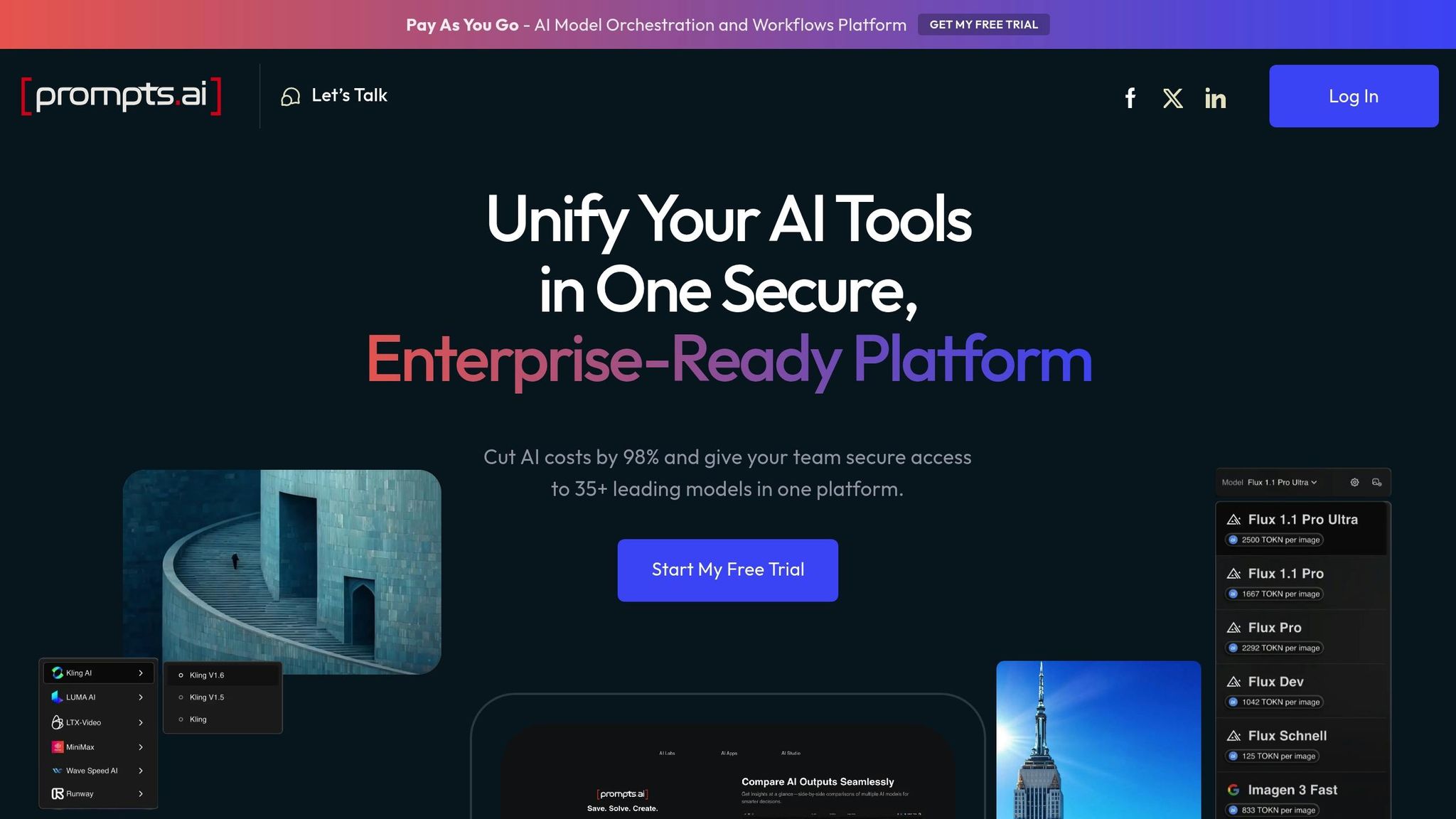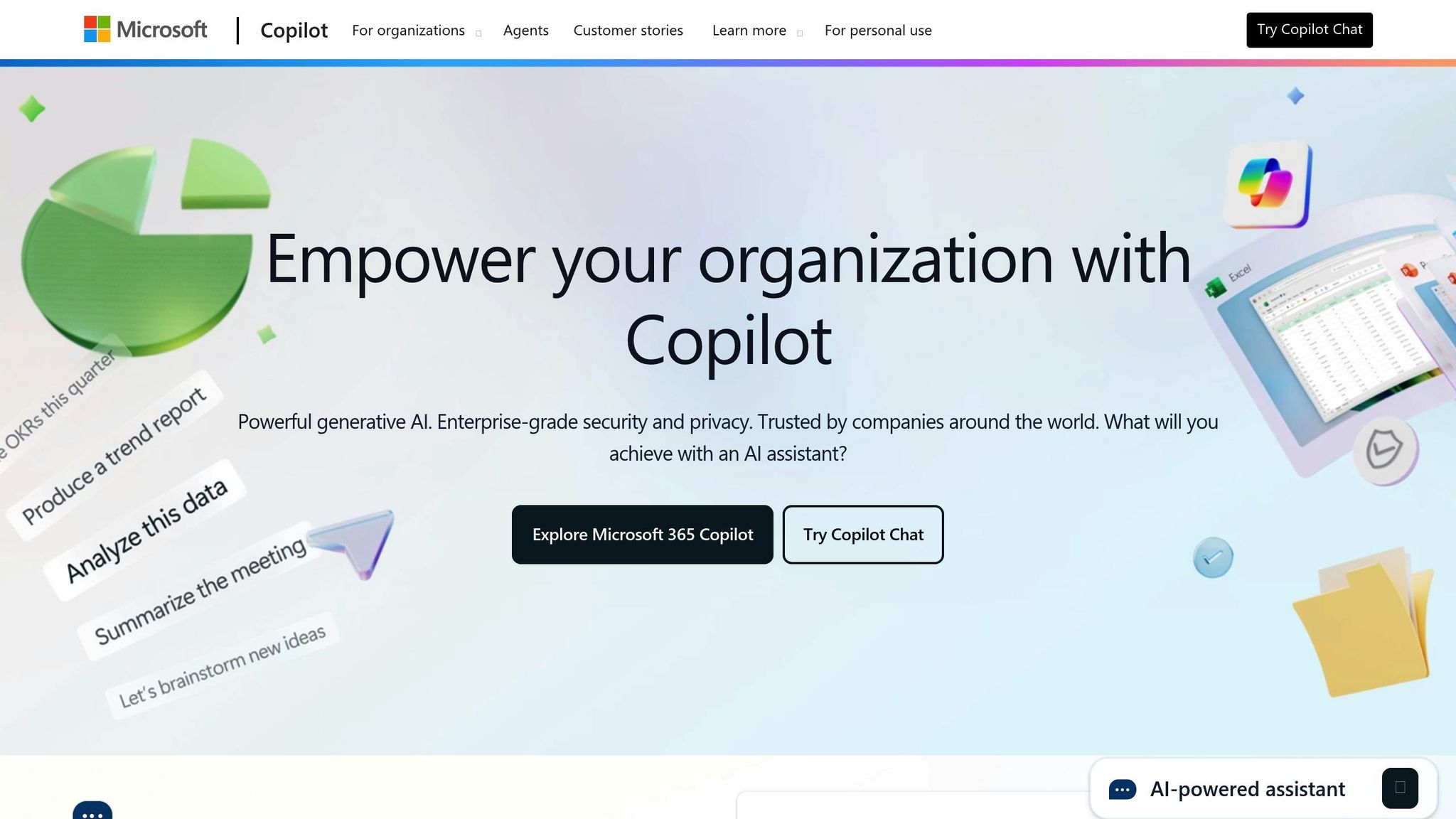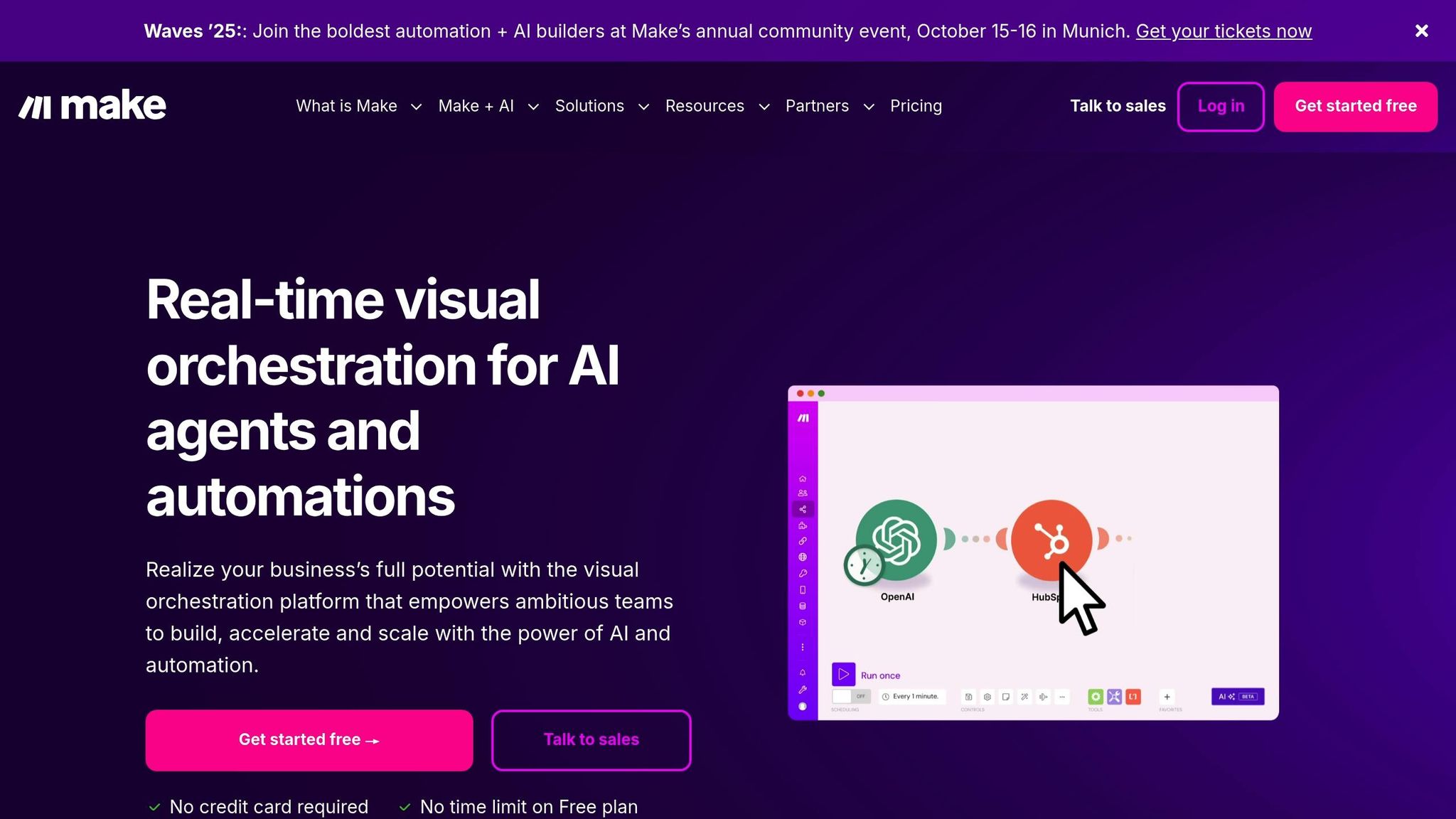
Artificial intelligence is reshaping businesses in the U.S., offering tools that streamline operations, cut costs, and boost productivity. This guide reviews three top AI platforms - Prompts.ai, Microsoft Copilot for Microsoft 365, and Make - highlighting their features, integration capabilities, pricing, and security. Here's what you need to know:
Quick Comparison:
| Platform | Core Strength | Pricing | Best For |
|---|---|---|---|
| Prompts.ai | Centralized access to 35+ AI models | $99+/month + TOKN | Enterprises scaling AI workflows |
| Microsoft Copilot | AI within Microsoft 365 tools | Add-on to 365 plans | Microsoft 365 users |
| Make | Visual automation for apps | Tiered subscriptions | Teams automating multi-step tasks |
These tools address different needs, from enterprise-grade AI orchestration to streamlined automation within familiar tools. Dive into the article for detailed insights and practical guidance.

Prompts.ai brings together over 35 leading large language models (LLMs), including GPT-5, Claude, LLaMA, and Gemini, into a unified and secure platform designed to create context-aware workflows tailored for business needs.
This platform has already made a mark with high-profile users such as Webflow, Instacart, and Shopify, where teams leverage its capabilities to optimize operations and manage complex tasks efficiently. Its adoption by these fast-growing companies highlights its ability to meet the demands of scaling businesses.
Prompts.ai integrates seamlessly with existing business tools through APIs and pre-built connectors. It works effortlessly with CRMs, project management platforms, and communication apps, embedding AI functionality into workflows without requiring extensive IT resources or system overhauls.
One standout feature is its no-code integration process, which allows teams to connect LLMs to their internal tools without needing programming expertise. This makes advanced AI automation accessible even to non-technical users, removing common barriers to AI adoption.
Additionally, the platform simplifies access to premium LLMs by eliminating the hassle of managing multiple API keys or separate billing agreements with various providers. This streamlined approach creates a foundation for smarter, automated workflows that are easy to implement.
Prompts.ai excels at automating tasks through intelligent prompt engineering and AI-driven execution. Users can set up triggers to automate customer communications, summarize meetings, extract critical information from documents, or manage content creation - all with minimal manual input.
For instance, a mid-sized marketing agency in the US used Prompts.ai to automate content generation and campaign reporting. This reduced their drafting time by 60% and significantly improved client response times.
Unlike basic rule-based systems, Prompts.ai handles context-aware automation. It processes complex scenarios and generates responses tailored to the specific situation, making it a powerful tool for businesses looking to enhance operational efficiency and reduce repetitive tasks.
One of the platform's standout features is its clear and predictable pricing structure, addressing a common pain point in AI adoption - hidden costs. Prompts.ai offers tiered subscription plans, with pricing displayed in USD (e.g., $99.00/month for Core business plans).
Its usage-based TOKN credits allow businesses to pay only for what they use, potentially reducing AI-related expenses by up to 98% compared to managing multiple subscriptions.
For larger organizations, the platform provides custom enterprise plans with specialized configurations, ensuring that pricing remains straightforward and scalable to meet varying business needs.
Prompts.ai prioritizes security with robust protocols, including data encryption (both in transit and at rest), role-based access controls, and regular security audits. For US-based organizations, it adheres to SOC 2 standards and offers features supporting HIPAA compliance, making it suitable for industries like healthcare.
The platform also includes enterprise governance features such as detailed audit trails for every AI interaction. This ensures businesses maintain full oversight of their AI usage, which is especially critical for regulated industries or those handling sensitive data.
Built on a cloud-native foundation, Prompts.ai dynamically adjusts resources to meet user demand, ensuring consistent performance whether supporting a small team or a large enterprise.
It accommodates multi-user management, high-volume API requests, and increased data loads without compromising service quality. Businesses can quickly scale by adding models, users, or teams, making it an ideal choice for growing organizations.
The platform also offers access to more than 35 leading AI models, allowing businesses to select the best tools for their specific needs and performance goals. This flexibility ensures that Prompts.ai evolves alongside its users, supporting growth at every stage.

Microsoft Copilot for Microsoft 365 integrates AI directly into familiar tools like Word, Excel, PowerPoint, Outlook, and Teams, helping users boost productivity within the Microsoft ecosystem they already rely on.
Copilot offers contextual AI support across the entire 365 suite. Let’s explore its core features, covering integration, automation, pricing, security, and scalability.
Unlike standalone solutions, Copilot is deeply embedded within the Microsoft 365 ecosystem, ensuring a smooth and connected user experience. This integration enables seamless workflows between apps - for instance, users can transform Word documents into PowerPoint presentations, create Excel formulas using natural language, or summarize Teams meetings directly within Outlook emails.
Copilot also connects with SharePoint, OneDrive, and Microsoft Graph, giving it secure access to organizational data. This allows the AI to reference specific company information, past emails, and shared files to generate more relevant suggestions and responses.
Copilot simplifies repetitive tasks across Excel, Word, Teams, and Outlook by using natural language commands. It can analyze data trends, draft content, manage meetings, and prioritize communications with ease.
In Teams, it enhances meeting management by summarizing discussions, tracking tasks, and drafting follow-up emails based on conversations. Similarly, in Outlook, Copilot can draft email replies, schedule meetings through natural language requests, and prioritize messages based on context - helping users stay organized and efficient.
Microsoft Copilot is offered as an add-on to existing Microsoft 365 subscriptions, following a per-user pricing model. Organizations with an eligible Microsoft 365 license can integrate Copilot’s AI features into their workflow without unexpected costs. Predictable monthly pricing options include bulk discounts and annual commitments, making it easier for businesses to plan their budgets.
Copilot inherits Microsoft 365’s robust security framework, which includes data encryption, multi-factor authentication, and conditional access policies. Importantly, it processes user queries without storing conversation history or learning from individual interactions.
For organizations in the U.S., Copilot supports compliance with key regulatory standards like HIPAA and SOX, leveraging Microsoft’s established certification processes. It also maintains audit logs for AI interactions, allowing businesses to monitor usage and ensure compliance.
To address data sovereignty concerns, organizations can set geographic boundaries for data processing. Additionally, Microsoft’s Customer Lockbox feature provides added control over support access to sensitive data.
Copilot is designed to scale alongside Microsoft 365, making it suitable for businesses of all sizes - from small teams to global enterprises. Microsoft’s global data center network ensures consistent performance, regardless of user location or the number of active users.
IT teams can manage Copilot rollouts using administrative controls, enabling phased deployments by department, group, or region. Integration with Microsoft Viva further enhances scalability by providing insights into AI usage patterns, helping organizations fine-tune deployment strategies and unlock additional productivity opportunities. This data-driven approach ensures businesses can fully leverage their investment in Copilot.

Make is a user-friendly visual automation platform designed to connect applications and simplify workflows. Its drag-and-drop interface makes it easy for non-technical users to create and manage complex automation.
The platform is particularly effective for building multi-step workflows that incorporate business logic, conditional actions, and real-time data transformations, making it an excellent choice for automating detailed processes.
One of Make's standout features is its extensive library of third-party integrations. It supports a wide array of popular business tools, from CRMs to marketing platforms and cloud storage services. This broad connectivity enables businesses to establish a unified digital ecosystem where data moves effortlessly between systems.
With its visual integration interface, Make simplifies the process of connecting different applications. Users can map data fields, apply conditional logic, and design intricate workflows without needing to write code. This empowers teams without technical expertise to independently build and manage integrations that would typically require a developer.
Make also handles advanced data processing, ensuring real-time synchronization across platforms. This seamless data flow enables businesses to implement automated, multi-step processes with ease.
Make shines when it comes to automating complex workflows that touch multiple business systems. It can handle conditional logic and perform data transformations based on custom business rules. The platform’s flexibility allows users to tailor workflows to their exact needs, while real-time processing ensures tasks are executed immediately upon triggering, keeping operations running smoothly.
Beyond its integration and automation capabilities, Make is designed to grow alongside your business. Whether you're a small startup or a large enterprise, the platform adapts to your evolving needs. As integration demands increase, Make’s infrastructure scales to handle the load without compromising performance. This scalability makes it a reliable solution for businesses aiming to streamline and expand their AI-driven workflow automation efforts. By simplifying even the most complex integrations, Make supports businesses at every stage of growth.
Prompts.ai stands out as a powerful tool for enterprise AI orchestration, offering unparalleled cost clarity, model variety, and robust security. However, its adoption does come with a learning curve, particularly in mastering prompt engineering.
The platform integrates over 35 top-tier AI models through a secure, transparent, and pay-as-you-go TOKN system, potentially cutting costs by as much as 98%. By consolidating AI workflows, it eliminates unnecessary subscriptions. That said, teams may need to invest time in developing prompt engineering skills during the initial setup phase to fully leverage its capabilities.
Prompts.ai also prioritizes security with built-in governance features and audit trails for every interaction. Its FinOps tracking and pre-built prompt templates simplify integration and help organizations move from one-off experiments to scalable, compliant AI processes.
Here’s a summary of Prompts.ai’s key features and considerations:
| Criteria | Prompts.ai Features | Considerations |
|---|---|---|
| Interoperability | Unified interface connecting over 35 leading AI models through an API-first architecture. | Mastery of prompt engineering is essential for selecting the most suitable models. |
| Workflow Automation | Advanced orchestration with pre-designed prompt templates to streamline operations. | Teams may require time to adapt workflows and fully utilize advanced features. |
| Cost Transparency | FinOps tracking with a pay-as-you-go pricing model, reducing expenses by up to 98%. | Active monitoring of TOKN usage is necessary to maximize cost-saving opportunities. |
| Security & Compliance | Enterprise-grade controls with audit trails ensuring secure and compliant interactions. | Built to meet the stringent compliance needs of large organizations. |
| Scalability | Designed for enterprise workloads, allowing seamless scaling of models, users, and teams. | Onboarding and training are critical for smooth scaling and widespread adoption. |
While Prompts.ai excels in cost control, security, and integration, organizations must be ready to invest in training and prompt engineering to unlock its full potential. With its robust features and transparent pricing, it positions itself as a valuable tool for enterprises managing AI workflows.
When choosing AI tools for business, the decision hinges on balancing performance, cost, and governance. Let’s break down the key considerations that define effective platforms.
Interoperability is a game-changer. Platforms that provide access to a variety of AI models enable teams to align specific tasks with the most suitable technology, all while avoiding the pitfalls of vendor lock-in.
Cost efficiency is equally important. Traditional subscription models often lead to inflated expenses, whereas pay-as-you-go pricing combined with real-time usage tracking can reduce costs by as much as 98%. This approach not only saves money but also complements the need for seamless integration and robust security.
Governance and security are non-negotiable. Features like audit trails, compliance controls, and data protection elevate AI from experimental tools to reliable, production-ready solutions.
To make the most of AI, businesses should prioritize platforms that offer expansive model access, transparent pricing, and strong security measures. Investing in prompt engineering and adapting workflows can unlock higher productivity and substantial cost reductions, paving the way for scalable and well-regulated AI operations.
The future of business AI lies in unified, secure platforms that simplify workflows, eliminate tool redundancies, and drive efficiency to new levels. These principles highlight the essential factors for making informed decisions in this space.
Prompts.ai offers a no-code integration that allows businesses to automate tasks, refine workflows, and create digital solutions - all without requiring coding skills. This feature makes AI tools accessible to teams, even those without a technical background, enabling quicker and more effective adoption.
By minimizing the need for specialized developers, businesses can save time, cut operational expenses, and direct their attention to strategic goals. This approach simplifies processes and removes technical hurdles, making it easier for organizations to tap into AI's potential.
Microsoft Copilot places a strong emphasis on keeping your data secure and compliant. It achieves this through encryption for data both at rest and in transit, alongside rigorous data isolation protocols. To further enhance protection, it incorporates robust physical security measures designed to safeguard sensitive information.
The platform also aligns with key regulatory frameworks such as GDPR, ISO 27001, and HIPAA, ensuring it meets stringent compliance standards. In addition, prompts and responses are safeguarded with advanced enterprise data protection (EDP) tools, reinforcing the confidentiality and integrity of your business data. These measures collectively ensure your data remains secure and compliant at every step.
Make enables users without technical expertise to automate intricate workflows through a visual, drag-and-drop interface - no coding required. With prebuilt templates and connectors, it simplifies designing and managing workflows, making the process intuitive and stress-free.
These no-code tools are a perfect fit for business teams and citizen developers, offering an easy way to optimize operations, boost efficiency, and expand automation across multiple tasks. By eliminating the need for technical skills, Make ensures that automation is within reach for everyone.


